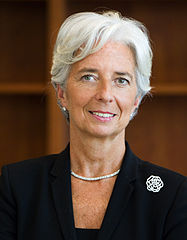Today and officially Mario Draghi delivers the leadership of the ECB to her new president, Christine Lagarde. The achievements of the “Super Mario” of this great ECB leader that functioned during his tenure as a new Charlemagne by ensuring that the euro area unity is implemented in its monetary policies, can be summarised in the fact that it delivers a Eurozone that has escaped the risk of being dismembered.
by Thanos S. Chonthrogiannis
©The law of intellectual property is prohibited in any way unlawful use/appropriation of this article, with heavy civil and criminal penalties for the infringer.
The Eurozone was in danger of being dismembered on a continuous basis after the global financial crisis of 2008 and mainly from 2012 onwards. A financial crisis that was in its highest intensity when he took the reins of the ECB in 2011, forcing him to make the historic for Europe phrase in London (2012) “I will do whatever it takes to save the euro and believe me it will suffice”.

Photo by website of www.investopedia.org
Then to deliver his promise he implemented a gigantic dimensional quantitative easing program (€2.8 trillion) managing to restore and maintain the serenity in the bond markets.
The specific quantitative easing program he applied created 11 million jobs in the Eurozone and after the debt crisis.
He succeeded in rescuing Greece, an unofficially bankrupt EU member state with an unsustainable debt of General government refusing when it was asked to interrupt liquidity in unofficially bankrupt Greek banks.
Today, he delivers the basic euro-borrowing rate to -0,5%, causing protests and divisions within the ECB, as he has pledged the next ECB president to implement a new smaller size compared to the previous quantitative easing program.
His opponents and his unfailing critics credit him as a failure that he failed in technically increasing the inflation of the Eurozone, which despite negative interest rates and bond markets insists on being at 0,8% when the target and based on the ECB’s statute is 2%.
To increase technical inflation, a combination of monetary and fiscal policies is required. In the case of the Eurozone, the common fiscal and tax policy does not exist. Only the monetary policy part exists, and this has been implemented exceptionally by ‘Super Mario’.
It is therefore necessary to supplement this gap in the economic policy of the Euro area by creating a centralised budgetary mechanism in the form of a common federal budget and a common system of social security.
If this common fiscal mechanism is absent, both the quantitative easing programs of the ECB will continue to apply.

New ECB President Christine Lagarde is more of a politician than an economist-technocrat. It comes from the legal area and may be the most appropriate person to take over the ECB, since it should bridge the divide between the members of the ECB and always because of the applicable monetary policies of Mario Draghi (10 of the 25 ECB members turned against Mario Draghi at the last meeting of the ECB).
Christine Lagarde’s biggest challenge as a politician and head of the ECB is to persuade the governments of Eurozone member countries to move forward in shaping a common federal budget for the euro and the Eurozone that will open the road later and for a common social security system throughout the Eurozone.
Otherwise, the mandatory applications of quantitative easing programs of the ECB will continue and the failures of the governments of the Eurozone member countries in creating growth, due to a lack of common fiscal and tax policy throughout Eurozone, will indicate as responsible for this the new ECB President.







